|

Painter on the Road to Tarascon
Van Gogh
August 1888
_______________________
Vincent, Homesick for the Land of Pictures
Peter Gizzi
Is this what you intended, Vincent
that we take our rest at the end of the grove
nestled into our portion beneath the bird's migration
saying, who and how am I made better through struggle.
Or why am I I inside this empty arboretum
this inward spiral of whoop ass and vision
the leafy vine twisting and choking the tree.
O, dear heaven, if you are indeed that
or if you can indeed hear what I might say
heal me and grant me laughter's bounty
of eyes and smiles, of eyes and affection.
(....)
These starry nights alone and connected alive at the edge
the sky, the moon, the many heavenly forms
the sheer vertical act of feeling caught up in it.
To be held tight, wound tighter in the act of seeing
the gemstone brushstrokes in rays and shimmers.
The night sky, the deep sense of space, actual bodies of light
and the toil and worry and animal fear always with us
wondrous and strange companion to all our days.
To wonder and to dream and to look up at it
to go out underneath it all above and sparkling
to step into it as into a large surf in late August.
...(more)
Peter Gizzi at PennSound,the Poetry Foundation and Poetry International
A Thousand Labyrinths
Ange Mlinko reviews Peter Gizzi's In Defense of Nothing: Selected Poems, 1987-2011
_______________________
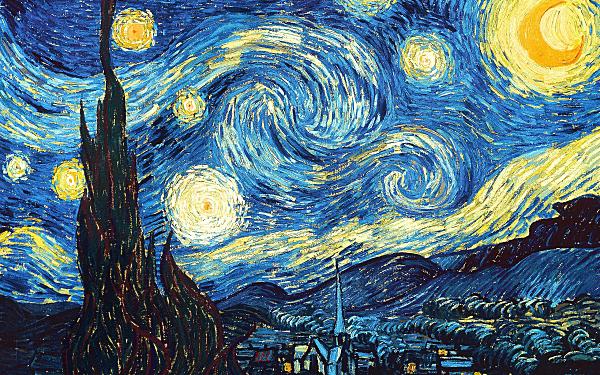
The Starry Night
Vincent van Gogh
1889
_______________________
Beginning With A Phrase From Simone Weil
Peter Gizzi
There is no better time than the present when we have lost
everything. It doesn't mean rain falling
at a certain declension, at a variable speed is without
purpose or design.
The present everything is lost in time, according to laws
of physics things shift
when we lose sight of a present,
when there is no more everything. No more presence in
everything loved.
In the expanding model things slowly drift and
everything better than the present is lost in no time.
A day mulches according to gravity
and the sow bug marches. Gone, the hinge cracks, the
gate swings a breeze,
breeze contingent upon a grace opening to air,
velocity tied to winging clay. Every anything in its
peculiar station.
...(more)
_______________________
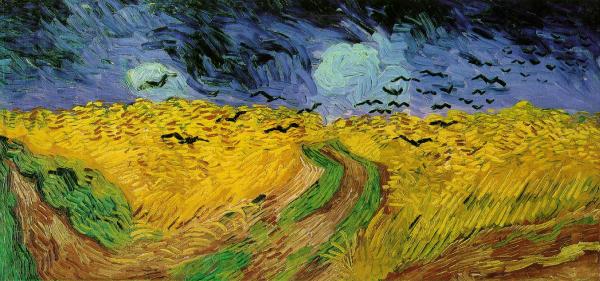
Wheatfield with Crows
Van Gogh
1890
_______________________
Q&A with Peter Gizzi
by Levi Rubeck
bomb
Peter Gizzi
... song has always been essential to this quest, a language being set to a music, or more specifically, for me, a sound that is an environment.
And that environment is always a negotiation between the accident of selfhood and tradition. Which is to say, that my reading, my bibliography, is a large part of my "autobiography." I am interested in how what I read-and what I write-performs and reveals to me my selfhood. In the past decade, 19th century America has been my foundation and my ground. What I've learned from that particular moment, going back to a "stance," as I mentioned above, is that poetry, American poetry in particular, is absolutely new and absolutely wide open. When I think that the first proper edition of Emily Dickinson's poems appeared just a few years before I was born, and that it was primarily in the 1980s, when I was in my 20s, that the NYU Press started producing variorum editions from Whitman's archive, it allows me to imagine that this information is still profoundly contemporary. The signal is still opening. And those 19th century authors, who were writing into the hegemony or the totalizing effect of British canonical literature, were discovering my language, the American language, with its promise, its failures, its homely motor, and its homespun condition of a developing literature. I'm not waving a flag, I'm just stating a condition of discovery. For instance, I can hear Dickinson's spiky, haunted, rebellious, and eerie tunes as punk. Poetry has become so highly populated by trenchant positions that we forget, or I can sometimes forget, that it's still open and that I too am free to become myself and to discover my voice outside of the narrowing and fracturing of micro-positioning. What's "punk" in all this is the DIY reality of the homemade, the raw voice, with its asymmetries, its reaching, and its limits.
...(more)
_______________________
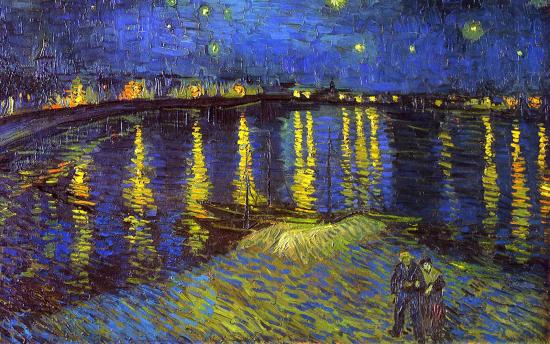
Starry Night over the Rhone
Van Gogh
1888
_______________________
The utter insufficiency of anti-suicide activism
-Automatic Writing
(....)
What's missing from all of these efforts by mainstream culture to address the issue of suicide is any capacity to grapple with the ambivalence of life in this society. What I mean by this is the recognition that life does not automatically provide us with a reason to carry on, that the world is not waiting to shower us with pleasures if only we would embrace it. Uncertainty and vulnerability are fundamental to the human condition, and thus too are anxiety, despair, and pain. The possibility of boredom is proof enough that mere experience is insufficient. If we find a reason to persist with life, a possibility for enjoyment, it is the result of a process of struggle, an active creation - the product of an act of will, or perhaps faith, not of reason. There is always the possibility of hope, perhaps, but it is pure fantasy to suggest that it is always immediately available to us in all circumstances.
In my experience, a good psychotherapist understands this, and is willing to engage with the validity of negativity. But as a culture we do not permit such things to be expressed and acknowledged. Instead all we can muster is the absurd moralising insistence that life is always worth living - an axiom that cannot be questioned - and the corollary pathologisation of the real lived experience of those who feel otherwise. Perhaps it is because existential questions are painful that such things are confined to the therapeutic situation and the backrooms of philosophy departments. Perhaps it is because those of us who are "healthy" recognise on some level the precariousness of that position. I don't know. But I do know that socially-enforced positivity, the social ethic that commands that life must be enjoyed, consigns the reality of negativity to a grim and dangerous silence.
...(more)
_______________________

"Undergrowth with a Couple"
Van Gogh
1890
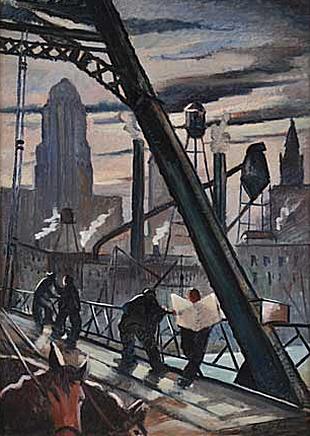
George Luks
_______________________
Occupied Language
Chandramohan S
The New Verse News
The adjectives were abandoned
Suffixes and prefixes scrambled
Vowels lynched and hung upside down
Epithets beheaded
Remnants from shattered strings
Conjoined for a synthetic memory
The unoccupied portions on the
Map of alphabets resemble
A Hieroglyphic of colonial logic symbols,
The refugees flee through edited check-points
And seek asylum in an alien tongue
Bleaching through barbed wire fences of apartheid
Abbreviating their surnames and
Dislocating their punctuations
Silencing their phonetics in sound bytes
Stripping bare the sterile meat of
An evacuated language
Nervous Flowers
Chandramohan.S counterpunch
Two poems by Chandramohan SThe Shared Mirror
Poems By Chandramohan SContemporary Literary Review India
3 Poems on Mythology by Chandramohan SThe Naked Kaali _______________________
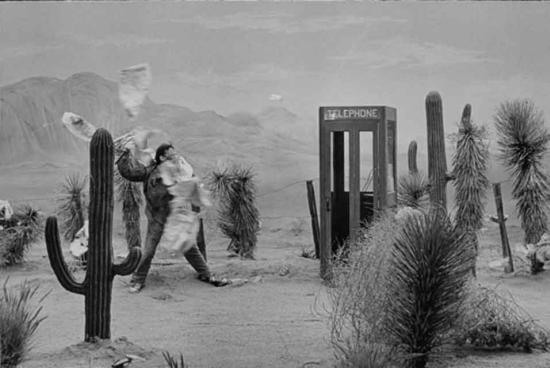
Neil Young in Desert Shot
photos by Dennis Hopper
1 2
_______________________
My Short Career in the Internet Outrage Business
Dale Eisinger
the awl
The target demographic: white males, Rust Belt, fifty-plus. We came in early; I saw the sunrise every morning. We worked in New York City, but I don't think a single coworker lived there. They commuted from Long Island and Jersey and Philly, daily, to be in the office. I lived alone in Brooklyn and it was a straight shot on the M to Bryant Park. I could see the lawn and the library from my desk—the gold and yellow and green filtered light. I went home in the afternoon and got ready for bed before my friends clocked off, so I drank alone. I wasn’t alienated from the labor; the labor alienated me from everything else.
We made up the New York office of a conservative media company based in the South. In hindsight, the politics seem both hyper-specific and nebulous; the one constant is that they orbited around white-hot outrage and fear. This was not obvious to me when I replied to the "Digital Reporter" listing. I’d been in the business for a few years by then, writing candidly about art and music and related topics, and my track record wasn’t hard to come by: it would have been clear to anyone checking that I stood on the liberal side of things. But the earnest man conducting my interview assured me that my politics had nothing to do with the scope of the work I’d be doing. For the most part, he was correct. We’re all actors on the internet, right?
“Fuck it,” I said to myself, “You’ll have a job writing news.” Which is not to be confused with breaking news (getting a tip, making the wire) or reporting news (collecting a first-hand account) or making news happen (punching someone at a wedding). I was writing the news, over and over and over again. Some people call this aggregating or blogging; I called it a job. My necessary skillset was narrow.
...(more)
_______________________
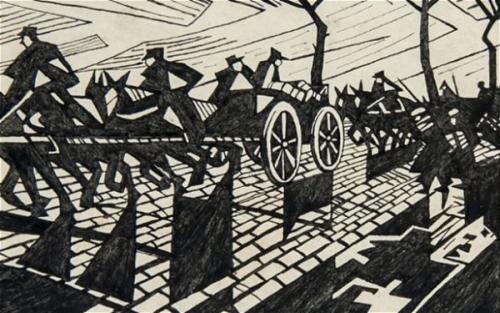
On the Road to Ypres
1916
Christopher Richard Wynne Nevinson
b. August 13, 1889
_______________________
Pushback: Expressions of resistance to the “evertime” of constant online connectivity
Stacey L Morrison, Ricardo Gomez
first monday
Abstract
As a result of the widespread connectivity provided by smartphones, laptops, and tablets, technology users can and often are continuously connected to the Internet and its communication services, a phenomenon some start to call “evertime.” However, many users who first embraced constant connectivity are now pushing back, looking for ways to resist being permanently connected and contactable. This pushback behavior is increasingly visible in the popular press, in personal blogs, and in a small number of academic studies. “Pushback” is a growing phenomenon among frequent technology users seeking to regain control, establish boundaries, resist information overload, and establish greater personal life balance. This study examines a growing body of both academic and non–academic literature, and identifies five primary motivations and five primary behaviors related to pushback. Primary pushback motivations include emotional dissatisfaction, external values, taking control, addiction, and privacy. Primary pushback behaviors are behavior adaptation, social agreement, no problem, tech control, and back to the woods. The implications these pushback motivations and behaviors pose to communication technology are discussed.
_______________________
On Global Citizenship [pdf]
James Tully
in dialogue
‘Global citizenship’ has emerged as the locus of struggles on the
ground and of reflection and contestation in theory. This is scarcely
surprising. Many of the central and most enduring struggles in
the history of politics have taken place in and over the language of
citizenship and the activities and institutions into which it is woven.
One could say that the hopes and dreams and fears and xenophobia
of centuries of individual and collective political actors are expressed
in the overlapping and conflicting histories of the uses of the language
of citizenship, the forms of life in which they have been employed and
the locales in which they take place. This motley ensemble of contested
languages, activities and institutions constitutes the inherited field of
citizenship today.
(....)
When ‘globalization’ and ‘citizenship’ are combined they not only
bring their contested histories of meanings with them, their conjunction
brings into being a complex new field that raises new questions and
elicits new answers concerning the meaning of, and relationship
between, global governance and global citizenship. When we enquire
into global citizenship, therefore, we are already thrown into this
remarkably complex inherited field of contested languages, activities,
institutions, processes and the environs in which they take place. This
conjoint field is the problematization of global citizenship: The way that
formerly disparate activities, institutions, processes and languages have
been gathered together under the rubric of ‘global citizenship’, becomes
the site of contestation in practice, and formulated as a problem in
research, policy and theory, to which diverse solutions are presented
and debated.
the anthropo.scene
making up the 'world' with what we have on hand
via —synthetic_zero
_______________________
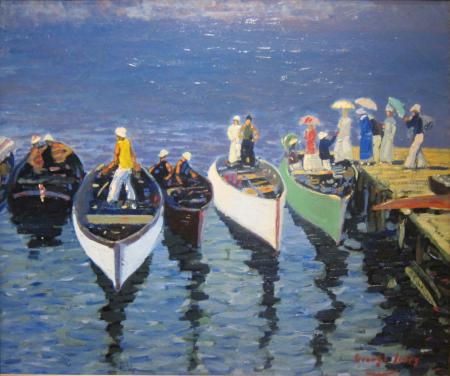
Holiday on the Hudson
c. 1912
George Luks
b. August 13, 1867
_______________________
Translation Questionnaire
We survey the ferrymen and women who battle the tide to bring literature to foreign shores.
full stop
_______________________
Walt Whitman, Democracy, and the New Poetry
Craig Hickman
dark ecologies - love and death in time's ruins
More and more as I begin thinking through many of the aspects of poetic theory, history, narrative, aesthetic, and tropic poetics whether of the metonymic middle-voice, or of the metaphoric splendors of old and new lyric empowerments I begin to see a specific shape taking place between – what, for lack of a better term, the science fictionalization of the modern mind in its quest for both a posthuman and transhumanist narrative. We seem upon the cusp of a great divide in humanity, one that will bring us either toward complete extinction, or toward other stranger possibilities. There are philosophers around the planet who even now are thinking deeply on these things. From the New Materialists as Iris van der Tuin and Rick Dolphijn explain,
“New materialism is then “new” in the sense that it is an attempt to ‘leap into the future without adequate preparation in the present, through becoming, a movement of becoming-more and becoming-other, which involves the orientation to the creation of the new, to an unknown future, what is no longer recognizable in terms of the present.’ In art this analysis could be the study of matter and meaning”.
What does this mean for poetry?
...(more)

River in Forest
1908
Kazimir Malevich
1879 - 1935
_______________________
Dreams Photographers Appear To
Arkadii Dragomoshchenko
Translated by Bela Shayevich
a silkscreen for Anatoly Barzakh’s leg cast
“We are dying.” Does this mean that flowers are wilting, how.
Does it mean they are crumbling with the prattle of ash —
while we are in other countries, without passports,
no transportation, some Casablanca, a station.
Touch anything and then, much later,
“in the meanwhile” will stratify afterwards.
Just “merely.” Does it mean that the gesture shimmers
like a draft in a passage, where a point
can never surpass the measure of ripples,
when you equal the sum of your pupil and moisture;
the sunset curled into it like a pledge. The air is dark —
who breathes it? Clenched and stale.
Dry. Like a beach, untroubled. You’re just a thistle,
an assimilation matrix for the stoma of color,
a grainy film on the tongue, acid amusement
of a free afternoon. A glass print
of a brass key on a wax string.
Ice or thaw — either one being
habitual to doves on the amethyst —
In any case, words give no work. With us are: “slopes,” “heel,”
“numbering” of bowstring co-oscillations. Also out of tune
song. Yet no … there’s the window
half a meter away, within reach — enormous,
like chewing croutons with your gums.
Besides, it’s long been open … No hemorrhaging,
immortality in rusty quicklime. Nothing
darkens the hand, no ink falls on the white field.
New translations
Arkadii Dragomoshchenko
_______________________
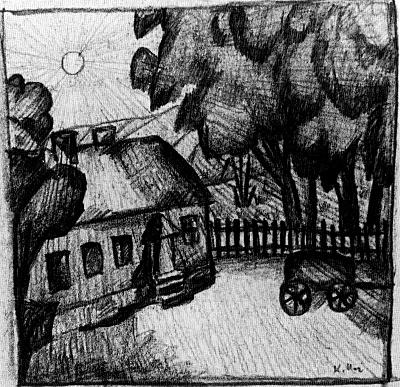
House in the wall
Kazimir Malevich
1911
_______________________
What We Talk About When We Talk About Poetry: A Recent
View from St. Petersburg
A Translation of Arkadii Dragomoshchenko's "On the
Superfluous"
Evgeny Pavlov
1.
It is not particularly appropriate to speak of poetry these days (today it is something unnecessary, superfluous; something that has become the lot of either poetologists trying to extract some ontological root from ephemeral quadratures, or of sentimental ignoramuses who at some point should have gone to police school). Yet it is difficult to say accurately how popular it was in the times that in turn shifted "poetic conversations" into a class of partially unidentifiable phenomena. Having gone through a series of procedures in which it was simplified by aesthetics and pneumatology, poetry found itself at a place where "everything is understood" or, on the contrary, is not worth understanding. This is at best; at worst, poetry has arrived at a certain ideological space that represents it as an instrumental practice of language.
2.
Despite attempts at decolonizing and excluding poetry from the sphere of Great Literature, and subsequently introducing it into the conventional bounds of writing, it was gradually barred from naively questioning its own nature as well as the limits of the actual scene, that is, its book, one of the totalizing forms that offer the world existence beyond any "picture."
...(more)
.....................................................
From Phosphor
Arkadii Dragomoshchenko
Trans. Lyn Hejinian and Elena Balashova
[1]
Habits of mind result from a redistribution of the places on
which the eyes fall. Yes, I'm probably right about this.
What I'm thinking about at this particular moment allows me
to assume so. A rusty rat crossing the street. A soft,
interminable twilight, and above it the night lights
burning. The room in which we lived was almost eighteen
meters long. In the mornings, on streets billowing steam, I
went around the corner, bare foot but for sandals, to drink
a cup of hot milk and eat cheese pastry. Liteiny Prospekt
was blinding. I shuffled along in unbuckled sandals. Amid
mocking seagulls and love cries. Through a courtyard to the
Fontanka, passing the library, toward the circus, the
bridge. This is about many things. It's about emigration.
About T.S. Eliot and Turgenev. But what are you thinking
about? What did or what does your life consist of? I like
your question. In the kitchen in a glass jar she kept
demons (warring with cockroaches) which she fed with
poppyseeds. Your question comes at absolutely the right
moment, although it makes me slightly nauseous, the way
roses or moldy dolls might--vertigo. By evening my skin
stung from the sun. It happened the first time on an
anthill. They rushed frantically toward the river. As if
through a magnifying glass. In the future, if he's to
recount a couple of the plots that interest him (let's
suppose), he will have to get rid of her. But of whom, one
wants to know! History? Geometry? Mental habits? One of
these plots begins with a murder.
...(more)
_______________________
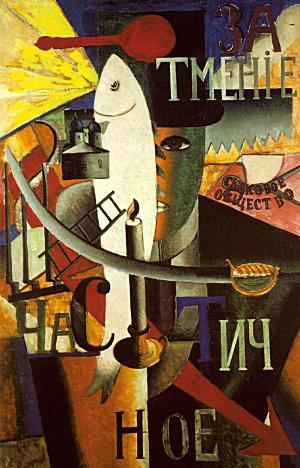
An Englishman in Moscow
Kazimir Malevich
1914
_______________________
Russian poetic counterpublics
Kevin M. F. Platt
Some use difficult and challenging language. Others write about difficult topics. The writing of some may not correspond to common expectations among readers. Some are simply ornery. For a poet writing in English for American audiences, or a Russian writing for Russian audiences, being difficult might result in a more modestly scaled audience and publication in small journals and small presses — circumscribed circulation in poetic counterpublics. Yet when it comes to translations from one language to another, the consequence of difficulty often is simply neglect.
Translation (which in any case accounts for a tiny portion of poetry published in the US) depends on the tastes and knowledge of the small community of adepts possessed of the necessary linguistic skills, time, passion, and purpose. In the case of Russian poetry over the course of the twentieth century, the situation was rendered more challenging by constraints on access to underground, unpublished, or self-published poetry (samizdat, as it was called), and by Cold War literary politics that dictated which poets were worthy of translation. To reach an Anglophone audience, Russian poetry had to pass through a complex system of filters, baffles, valves, and grates — crossing not only linguistic barriers, but also material, social, and ideological ones. Of course, the same may be said of any act of translation. My point is that these conditions were intensified to an extreme in the case of Russian poetry for much of the twentieth century. Russian poetic counterpublics were rendered remote, unknown enclaves of writing.
...(more)
_______________________
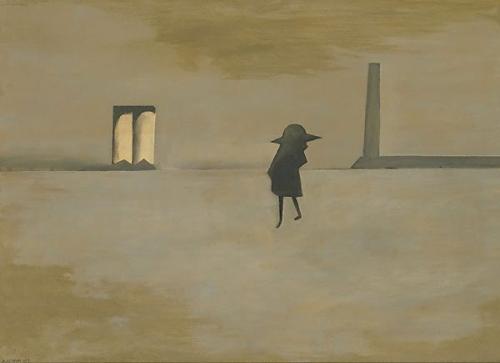
Girl dreaming
Charles Blackman
1953
_______________________
Metamorphoses of Reality: An Introduction to New Ukrainian Writing
Oleksandr Mykhed
Translation by Iryna Shuvalova
words without borders
(....)
Resisting the temptation to introduce stories born out of protest, I decided to bring together work that would remain interesting and effective regardless of the political situation in the country and the media craze. My aim was to present the work of writers of approximately the same generation from different parts of the country. They might well be the ones whose writing will define what Ukrainian literature will look like in the decades ahead, and their best work might well be yet unwritten.
The short stories you read here are part of broader narrative clusters—fragments of conceptual collections. They work as stand-alone pieces, but when viewed as parts of these collections, they acquire new shades of meaning. This selection serves to emphasize several characteristic features of contemporary Ukrainian literature. Among the most important of these is its connection with the baroque tradition, which has remained of utmost importance in Ukrainian culture for centuries. In our three stories, this connection is especially evident in the baroque concept of the memento mori, which, in turn, is seen in a new light through the idea of metamorphosis—a person’s surreal transformation, or transition into a new body.
A characteristic feature of Ukrainian writing in the past decade has been its depiction and exploration of reality not directly through the realistic narrative, but rather through the surreal and fantastical, the false mirrors of reality. Possibly, it is only such mirrors that are capable of adequately displaying the fragmented reality inhabited by Ukrainian authors and readers. Over the past twenty years that reality has swung from Soviet ruin to wild capitalism, to oligarchy and VIP life in a glamorous setting (still Soviet in its essence). Values have eroded and ideals have been reformed, all of it creating cracks in people’s minds, as well as in reality itself.
...(more)
_______________________
Three translations of Osip Mandelstam’s “Stalin’s Epigram”
Ian Probstein
It is said that a translator is like a spy: if everything is fine, the author of the original is praised and the translator is barely noticed; if not, the translator is blamed. Having that in mind, I am going to discuss several translations of Osip Mandelstam's "Stalin's Epigram", which cost him two exiles and eventually, life.
plus three more
_______________________
 Alice
Charles Blackman
b. August 12, 1928
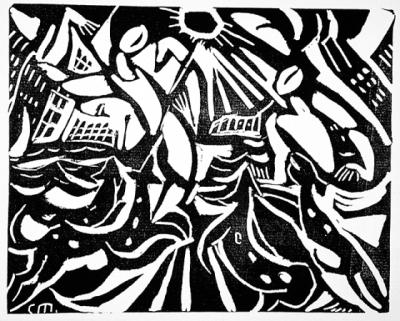
animals
circa 1914
Carlo Mense
d. August 11, 1965
_______________________
Histories of Lived Experience:
Intertwining Ethology, Ecology, And Aesthetics
Adam Robbert
Knowledge Ecology
...the focus of my talk is that an understanding of meaning is necessary for an understanding of evolution at its most fundamental level. A central claim of my talk is that we have to understand that which is meaningful to organisms if ever we hope to comprehend the history of evolution on Earth. My talk thus offers a non-anthropocentric and aesthetic account of meaning in the context of geological history. Ecology from this view is an ongoing entanglement of meanings, concerns, and decisions, and it marks the space where the division between matter and meaning breaks down.
(....)
... ecology is necessarily about transactions of meaning, translations of value, and transformations of significance, and it is in principle irreducible to mechanical description alone. By placing the qualitative sphere of meaning, value, and decision as simultaneous with—or even as the other side of—the quantitative sphere of number, extension, and motion, von Uexküll effectively overcomes what Whitehead calls the bifurcation of nature into primary and secondary qualities.
(....)
If ecology is to become a new ground for philosophy, then the transcendental and the empirical need to be re-thought as relational and evolving categories: What is transcendental structure for one organism is empirical datum for another, and what is given as a structure that affords certain appearances is neither fixed nor universal; it is rather developed, multispecies, and plastic. In other words, if lived experience is grounded in a certain kind of cognitive structure that allows empirical content to emerge in a certain way, then it is also the case that the structure of the transcendental is itself grounded in an external ecology of actuality and circumstance. Thus if we can speak of an upwelling of a stream of consciousness within the empty, form-giving space of the mind, then we can also speaking of an inwelling stream of external activity, that, over historical and evolutionary time periods, gives shape to the organizing structure itself.
In the view of a philosophical ecology, then, the transcendental is not an empty, universal space within which phenomena can emerge in a particular way but is instead a historically saturated medium, a medium filled with the tributaries of achieved conceptual understanding along which flows of thought constellate themselves as partial organizers of experience and which allow the growth of new kinds of experience. Mind is just such an intersection of rivers and tributaries; not a dialogic of easily opposed terms (e.g., “empirical” and “transcendental”) but an ecologic, a creative multiplicity of convergent events preserved over time.
...(more)
via Synthetic_zero
_______________________
Critical Theory After the Anthropocene
McKenzie Wark
Public Seminar Commons
(....)
2. Even to understand the Anthropocene in its own terms calls for a certain ‘vulgarity’ of thought. The Anthropocene is about the consequences of the production and reproduction of the means of existence of social life on a planetary scale. The Anthropocene calls for the definitive abandonment of the privileging of the superstructures, as the sole object of critique. The primary object of thought is something very basic now: the means of production of social life as a whole.
3. It seems likely that the Anthropocene as a kind of periodization more or less corresponds to the rise of capitalism. But it is no longer helpful, even if that is the case, to tarry among critical theories that only address capitalism and have nothing to say about other periods, other modes of production. The Anthropocene may be brief, but the Holocene is long. A much long(er) temporality is called for. It is ironic that critical theory, so immune in other ways to ‘anthropocentrism’, nevertheless insists on thinking in merely human time scales.
...(more)
_______________________
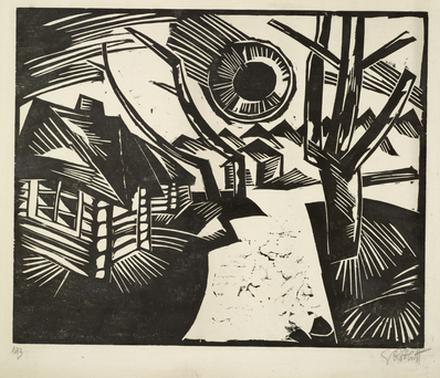
Russian Landscape with Sun
(1919)
Karl Schmidt-Rottluff
d. August 10, 1976
_______________________
Better Angels: On Rilke in Translation
Drew Calvert
the american reader
(....)
The heavens aren’t impressed with our cities, music, rockets, stadiums, search engines, or particle colliders. What can we offer that will give them a sense of what it means to be of the earth? William Gass, author of Reading Rilke: Reflections on the Problems of Translation, has a clever idea:
A billfold. Show the Angel a billfold that has ridden in a rear pocket on someone’s rump, the creases it now contains, where money and credit cards once slid in and out, as oiled and stained as a fielder’s glove; or a boy’s pocketknife, worn short and thin from all those days he’s whittled away; or a mohair sofa, shiny where the man wearing that billfold sat, or the cat curled, or love was made.
Gass is a resourceful guide to Rilke because he takes the poet seriously—his work, Gass writes, is proof that art can “matter through a lifetime”—without forgetting that German Romanticism (“the magical movement of matter into mind”) sounds rather precious to the uninitiated. For Gass, the Elegies are a prime example of just how transgressive art can be:
When one of us turns aside from living in order to admire life; when a rose petal is allowed to cool an eyelid, when a line of charcoal depicts the inviting length of a thigh; we are no longer going in nature’s direction but contrary to it. What was never meant for us becomes ours entirely; what never had a use is suddenly all we need.
Just as an interest in poetry is really an interest in the universe, “the problems of translations” are really the problems of how to describe the world—not to mention the greater problem of how to characterize the angels. Gass takes issue with a version that reads: “Every angel is terrible” (“Angels can’t be terrible,” he writes. “Pot-holed roads are terrible.”). His own choice, though, is hardly better: “Every angel is awesome.” (Angels can’t be awesome, either. Half-priced tequila is awesome.) But Gass is remarkably sensitive when it comes to Rilke’s religious allusions (“graceshaped swans” is hard to beat), and he makes a uniquely serious attempt to sketch out Rilke’s vision:
Raum. If there were one word it would be Raum. The space of things. The space of outer space. The space of the night which comes through porous windows to feed on our faces. The mystical carpet where lovers wrestle. The womb of the mother. Weltraum. ...(more)
_______________________

Karl Schmidt-Rottluff
_______________________
Ask Andrew W.K
village voice
(....)
The world isn't being destroyed by democrats or republicans, red or blue, liberal or conservative, religious or atheist -- the world is being destroyed by one side believing the other side is destroying the world. The world is being hurt and damaged by one group of people believing they're truly better people than the others who think differently. The world officially ends when we let our beliefs conquer love. We must not let this happen.
When we lump people into groups, quickly label them, and assume we know everything about them and their life based on a perceived world view, how they look, where they come from, etc., we are not behaving as full human beings. When we truly believe that some people are monsters, that they fundamentally are less human than we are, and that they deserve to have less than we do, we ourselves become the monsters. When we allow our emotions to be hypnotized by the excitement of petty bickering about seemingly important topics, we drift further and further away from the fragile and crucial human bond holding everything together. When we anticipate with ferocious glee the next chance we have to prove someone "wrong" and ourselves "right," all the while disregarding the vast complexity of almost every subject -- not to mention the universe as a whole -- we are reducing the beauty and magic of life to a "side" or a "type," or worst of all, an "answer." This is the power of politics at it's most sinister.
...(more)
via Dennis G. Jerz
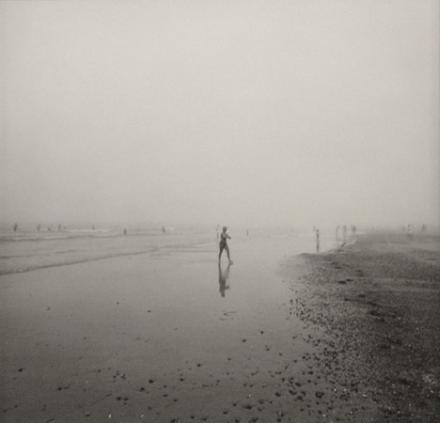
Cape Cod
Harry Callahan
1972
At The Water's Edge
Robert Mann Gallery
_______________________
Two men in a boat
Juha Hurme
Extracts from the novel Nyljetyt ajatukset (Fleeced thoughts)
Translated by Hildi Hawkins
books from Finland
(....)
To read a good book is a work of art,’ said Köpi, ‘A good book turns its reader into an artist. If you can’t read well, enthusiastically and fearlessly even when the text happens to be strange, you will never learn to write, in other words to live. Without readers there would be no literary texts. The text itself is a bunch of clues offered to the reader, enticing him or her to form a chain of black marks into meaning.
‘Modern physics shows us that the world is empty.
‘Modern aesthetics shows us that literature consists of gaps.
‘The masterworks of world literature are really strange, shapeless, uneven, scabby and feral: Don Quijote, Oblomov, Huckleberry Finn, Pride and Prejudice! A good reader and citizen trains over the course of his lifetime in the capacity to encounter strangeness fearlessly.
‘In Finnish, the root of the most important doing word of our lives, tietää, to know, is tie, road. The word entered the Finnish language at a time when the road was not a four-lane asphalt canyon dug out of the ground, signposted and lit, but a route through virgin forest and swamp that you had to know in order to follow. True knowledge, tietäminen, is independent wandering, route-finding, rambling, continual travelling to new, often unknown destinations.
‘Everyone is a traveller, a writer, an eternal student, an eternal writer, an eternal sceptic.
‘The terrain is difficult.
...(more)
_______________________

photo - mw
_______________________
The Poems of Ossip Mandelstam
tr. Ilya Bernstein (free pdf)
EPC Digital Editions
I know not since when
This little song began –
Who scrapes against it, what thief?
What tinkling mosquito-prince?
I would like to talk
About nothing once more,
To scrape a match, to push
The night awake with my shoulder;
To throw haystacks and haystacks apart,
And that heavy hat of air;
To rend, to tear the sack
Where the caraway is packed.
So that the pink blood’s link –
The tinkle of these dried herbs –
May be discovered, purloined
Across lifetime, hayloft, and sleep.
- 1922
E P C digital library
_______________________

El Port
1928
Joaquín Torres García
d. August 8, 1949
_______________________
Did Somebody Say ... George Orwell?
Owen Holland
(....)
The tolerability of transparency depends, for the most part, on who’s doing the watching (or looking, or seeing) as well as the material interests that motivate such ocular fascinations. Winston Smith, Orwell’s already dead last man, knows that he is watched and he knows, too, blessed as he is with an uncanny degree of foreknowledge, precisely where his narrative will end. We had provided Orwell with a proto-narrative, so behind Winston’s dark premonitions lurked the fate of Zamyatin’s nameless protagonist, D-503, who had already been lobotomised. All that remains of the optimistic vision of the Bauhaus in Nineteen Eighty-Four is an antique glass paperweight, or, in the recent stage production, a snow-globe, which looks remarkably like a microcosm of Zamyatin’s glass-world (or, say, the internet, now that we know it is also a vast Panopticon). ...(more)
_______________________
Symposion
Theoretical and Applied Inquiries in Philosophy and Social Sciences
Stoicism, Feminism and Autonomy [pdf]
Scott Aikin and Emily McGill-Rutherford
Abstract: The ancient Stoics had an uneven track record with regard to
women’s standing. On the one hand, they recognized women as fully capable of
rationality and virtue. On the other hand, they continued to hold that women’s
roles were in the home. These views are consistent, given Stoic value theory,
but are unacceptable on liberal feminist grounds. Stoic value theory, given
different emphasis on the ethical role of choice, is shown to be capable of
satisfying the liberal feminist requirement that autonomy must be respected. In
turn, a model for Stoic feminism is proposed.
via Daily Nous
_______________________
as/peers 7 (2014)
emerging voices in american studies
special issue on American anxieties
_______________________
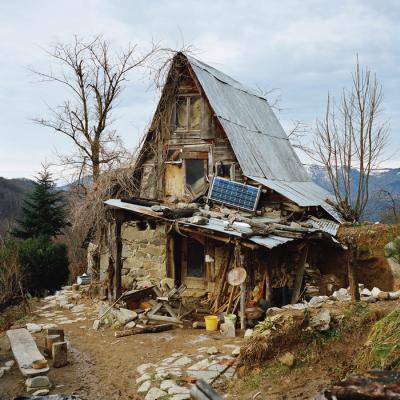
Scrublands
Antoine Bruy
via
_______________________
When Did We Start Caring About "Hopefully"? 250 Years of English Usage Advice
Robin Straaijer
slate
Bridging the Unbridgeable / A project on English usage guides
via Dangerousmeta!

Child and big bird
1912
Emil Nolde
b. August 7, 1867
_______________________
The Powers of Horror: An Essay on Abjection [pdf]
Julia Kristeva
Translated by Leon S. Roudiez
There looms, within abjection, one of those violent, dark revolts of being, directed against a threat that seems to emanate from an exorbitant outside or inside, ejected beyond the scope of the possible, the tolerable, the thinkable. It lies there, quite close, but it cannot be assimilated. It beseeches, worries, and fascinates desire, which, nevertheless, does not let itself be seduced. Apprehensive, desire turns aside; sickened, it rejects. A certainty protects it from the shameful—a certainty of which it is proud holds on to it. But simultaneously, just the same, that impetus, that spasm, that leap is drawn toward an elsewhere as tempting as it is condemned. Unflaggingly, like an inescapable boomerang, a vortex of summons and repulsion places the one haunted by it literally beside himself.
When I am beset by abjection, the twisted braid of affects and thoughts I call by such a name does not have, properly speaking, a definable object. The abject is not an ob-ject facing me, which I name or imagine. Nor is it an ob-jest, an otherness ceaselessly fleeing in a systematic quest of desire. What is abject is not my correlative, which, providing me with someone or something else as support, would allow me to be more or less detached and autonomous. The abject has only one quality of the object—that of being opposed to I. If the object, however, through its opposition, settles me within the fragile texture of a desire for meaning, which, as a matter of fact, makes me ceaselessly and infinitely homologous to it, what is abject, on the contrary, the jettisoned object, is radically excluded and draws me toward the place_where meaning collapses. A certain "ego" that merged with its master, a superego, has flatly driven it away. It lies outside, beyond the set, and does not seem to agree to the latter's rules of the game. And yet, from its place of banishment, the abject does not cease challenging its master. Without a sign (for him), it beseeches a discharge, a convulsion, a crying out. To each ego its object, to each superego its abject. It is not the white expanse or slack boredom of repression, not the translations and transformations of desire that wrench bodies, nights, and discourse; rather it is a brutish suffering that, "I" puts up with, sublime and devastated, for "I" deposits it to the father's account [verse au pere—pere-uersion]: I endure it, for I imagine that such is the desire of the other. A massive and sudden emergence of uncanniness, which, familiar as it might have been in an opaque and forgotten life, now harries me as radically separate, loathsome. Not me. Not that. But not nothing, either. A "something" that I do not recognize as a thing. A weight of meaninglessness, about which there is nothing insignificant, and which crushes me. On the edge of nonexistence and hallucination, of a reality that, if I acknowledge it, annihilates me. There, abject and abjection are my safeguards.The primers of my culture.
_______________________
Poems by Maxim Amelin
Translated by Derek Mong & Anne O. Fisher
Why Repeat Ourselves?
Why repeat ourselves? More than was called
for has been said, done, or rescued
from breakdown and downfall —
the ripe seed sleeps beneath the earth.
Shoots peep from soil into sunbeams;
neither heat nor hoarfrost crack
them. God guards each one from
the brigands — insect throngs, the wild flock.
Let foe follow foe, for all are earthly
vanity. The foliage that’s fallen
down won’t wither, it will redouble.
The sad vigil ends with morning’s adulation!
A flame forced the water to run,
and moisture fanned the fire’s spark,
but for the grand constellation now spun
there’s no harrier or stumbling block.
On the penny-wise all pound words
are wasted. The buried cities they insist
will be reborn simply confirm
what we already know: Pompeii existed.
...(more)
Resisting the art of entropy triumphant
An interview with Maxim Amelin jacket2
As a loving collector of eighteenth-century neologisms (coined by his models, the Russian classicists) and a devoted student of Revolutionary word-smithing (à la Mayakovsky), Amelin keeps his poetry in suspension through the tension of opposites. He is among the last generation of Russian poets to grow up in the Soviet Union and saw his culture and language change rapidly under the influx of Western words and ideas. The poet Alexei Tsvetkov, writing about Amelin’s generation, the so-called tridtsatiletnye (“The Thirty-Year-Olds”), called them “the children of perestroika — or one should say the orphans, since their alleged mother went missing long ago.”
_______________________

TheTrees ByTheDock
1910
Henri Eugène Augustin Le Sidaner
b. Aug. 7, 1862
_______________________
The Heron
Dorthe Nors
translated, from the Danish, by Martin Aitken
(....)
Things are contagious. Things want to get in through the cracks. That’s the way they are, and I know from a former colleague of mine that the woman was killed and dismembered in an apartment in the Vesterbro district and that the girl who lived in the apartment downstairs and who was studying veterinary science moved out not long afterward, even though her upstairs neighbor had been apprehended and sentenced for the murder. Who could blame her? She probably kept thinking about all the times she had passed him on the stairs. Most likely she felt the building was contaminated and even the slightest sound reminded her of the night she heard something going on upstairs. But something is always going on in the night, there are always the smells and the sounds: pigeons rustling in the attic, creatures on the move, and the herons of Frederiksberg Gardens can sometimes be seen, looking like gray poultry shears in the sky over Valby. The heron is an awkward bird in flight, and the Heron Man on the path leading to the Chinese Pavilion would do well to tell the herons so, seeing as how he’s always babbling away at them like that.
...(more)
_______________________

Sea with Yellow Sun
Emil Nolde
(1941-46)
_______________________
Three-Part Invention
Caleb Klaces
conjunctions
Above the pine trees leaning into the wet black bank, a zip moved up and down in the sky, as the treeline moved up and down, controlled by two eyes looking up and looking down through the window. The bank fell away. The train passed mounds of red slag. The eyes unzipped the canvas on which the mounds were painted, and the canvas curled forward under its own weight. Thin reeds with LED tips curled forward and so did yellow freight carriages, below the curved wings of two red kites, then four kites, then ten.
The carriage doors pished open and through them a conductor fell. His walk was a kind of fall. He held his ticket machine to his hip, as if it was a bad hip, and peered down, falling left and right, to count passengers. Each number was breathed in. A man who, boarding at Warwick Parkway, had placed his tickets on his table before sitting down to accompany them, turned at the sound of the doors, then looked with contempt at the back of the lax conductor’s head. Seeing the conductor pass, the two women on the same table each moved a hand from the gold clasp of a handbag to rest on its black patent leather. When the conductor pished out of the carriage, the man straightened his tickets. The women stared ahead, which happened to mean that they stared at one another. One woman laughed and the other didn’t laugh.
...(more)
Caleb Klaces is founding editor of Likestarlings
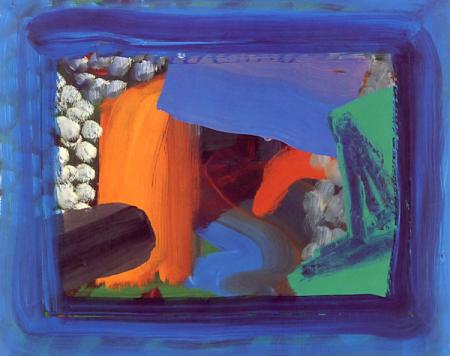
After Visiting David Hockney
1991 - 1992
Howard Hodgkin
b. August 6, 1932
_______________________
Generosity as Method
An Interview with Myung Mi Kim
Generosity doesn't exist, period. For me, where I can say politicize, I have to say that word generosity. Part of being political for me in this climate that we live in is trying to remember to have a human face. That's also where oppositional politics smack of a certain kind of patriarchy, because it's very unsubtle-as long as you oppose and you make it really clear that you're oppositional, then you can proceed. Of course you can be loud and convincing and forceful and forthright, you can persuade me, I wouldn't necessarily disagree with this sort of stance towards change, but it still has to be done with the human face, with attention to the implications of one's actions. We must track the meanings and residences of our actions.
So to be political or politicized, with that human face on, with the ability to read subtleties and nuances as to how you affect the systems around you, whether they are intimate relationships or professional environments, or whatever, how can we attend to that whole circuitry,, not just one corner of it, the corner you want to hit right now. My sense is that the work is so perplexing that it is never that kind of direct missile hit or direct translation. There's always the mistranslation, or the thing that didn't connect, or the people you forgot to say thank you to. How can we keep making wider the terms by which we politicize or radicalize? I think generosity is a possible mode by which we can tend to the business of listening and, ultimately, of change.
(....)
... If "I recognize you" can be one of the meanings of literature, then we've done a great deal of work. So yes, the particulars may differ, you may not be a one-point-five Korean American immigrant woman, but if there's something in the way I've been able to render my experience, that releases in the reader a way of speaking to her experience, then it doesn't matter that I'm Korean American and she's Chicano or whatever. It's the manner in which you're led into the experience, that either releases you or doesn't. But it has that possibility of connecting you to yourself, and hopefully to the writer's experience too, in some way. Ultimately it's the return to your own condition by something that you see another text take up that is so profound.
This was brought up in my Work of Silence Class-which is alot of what we were talking about-in fact the word "encounter" came into usage from the Celan essay "The Meridian." So what we're talking about is that moment of encounter between how the text makes itself and how the reader receives those actions. There's some sort of translatability that becomes part of the narrative if you will-the meaning of being able to read anything seems really important right now in our present moment where we've become inattentive to almost everything. To look at examples of texts that have come out of the near impossibility of speaking, texts that in a sense allow for the impossibility of speaking. To me this seems so unbearable and exquisite-
Y: Like Mallarme's "A Tomb For Anatole," which is really notations for a text he was never able to write.
M: And Paul Celan, Theresa Hak Kyung Cha. With these writers we are in the company of language that has been met with potential erasure; what happens in that kind of collaboration between the impossibility of utterance and finding the means by which to utter? That space is never a decided, resolved, fixed point, and part of the exquisiteness is that it is constantly in motion, constantly reshaping itself. I suppose any poem is that, and really is always on the cusp of coming into legibility-formally, psychically, politically. For me those works that keep re-invigorating that space of silence and erasure, the space of the seemingly untranslatable, are the ones in which you really feel some sort of endurance and power.
...(more)
via flowerville
.....................................................
The Meridian [pdf]
Paul Celan
translated by Rosemarie Waldrop
_______________________
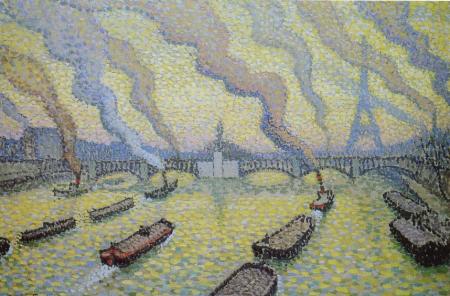
"La Seine à Grenelle"
1920
Jacques Martin-Ferrières
b. August 6, 1893
_______________________
Green Aquarium
Avrom Sutzkever
translated from Yiddish by Zackary Sholem Berger
presented by Jerome Rothenberg
(....)
II
“Walk through words like through a minefield: one false step, one false move, and all the words which you have threaded onto your veins your whole life will be torn apart, and you with them...”
That’s what my very own shadow whispered to me, when both of us, blinded by the reflector-windmills, traveled by night through a bloody minefield, and every stride of mine set down for life or death gouged my heart like a nail into a violin.
III
But no one warned me to be careful of words drunk from otherworldly poppy-blossoms. Thus I became the servant of their will. And I can’t understand their will. Certainly not the secret, whether they love or hate me. They wage war in my skull like termites in a desert. Their battlefield pours out of my eyes with the radiance of rubies. And children go gray from fear when I tell them, Good-dreaming.
...(more)
_______________________

Old Books
Howard Hodgkin
2006
_______________________
Lunch with Cioran (and more)
Janaki Challa
exquisite corpse
(....)
I know you are still alone, still
dark, still penciling equations,
scrawling cowardly cursive,
absolving grief through grief
as the crows burst, as water gleams in holy bowls,
a single melancholy flag against the unforgiving chill,
surely the dream of a novelist, or a nationalist.
But you are still Ephesus,
Pompeii, the Indus Valley, turning over and under:
ruins are your own memories reflected back,
one history ís definite pattern,
and so our first act of coming in the world
is to wail with mourning;
for all the things we had to forget,
To begin to remember again:
In both samsara and nirvana the room was the same
...(more)
_______________________
The Demands of Agnotology::Surveillance
Michael Betancourt
ctheory
(....)
The authorization for increasing the scope and breadth of collected information originates with this aspiration -- simply one dimension of the political economy of digital capitalism -- and so cannot be considered in isolation. Addressing the challenges posed by pervasive monitoring requires the recognition that it is not an isolated phenomenon -- rather, it is reflective of a broader collection of mutually reinforcing tendencies in digital capitalism itself. Surveillance, however broad and omnipresent, nevertheless is simply an epiphenomenon resulting from other, more fundamental demands.
(....)
Digital automation increasingly performs tasks that were formerly the exclusive domain of human intelligence, in the process enabling a broader and more complete surveillance than ever before. The ability to automate the recognition of faces, the ability to listen and transcribe speech, both tasks that require a different kind of intelligence than found in a clockwork mechanism, has enabled the pervasive monitoring of everyone's every activity rather than a small portion of those performed by selected individuals -- this expansive surveillance system is what Snowden revealed.
The broader significance of this confirmation is not technical, nor even an issue of privacy: surveillance has become a tool not only of governments, but of business, and of crime. The databases produced through this pervasive monitoring have become productive domains in themselves, creating value through the autonomous digital rearrangement of the information they contain. This new variety of unintelligent production impacts the organization and structure of society as a whole, creating a systemic crisis for capitalist value production that is unlike the periodic financial crises precipitated by a decline in the rate of value production over the past two hundred years: the deployment of surveillance, independent of any particular purpose, is linked to the inherent instability of digital capitalism; the forms of digital automation that enable pervasive monitoring are the root cause of this instability.
However, surveillance is only one half of a complementary pair. The systematic production of uncertainty ("'ignorance'") termed 'agnotology' provides what surveillance itself cannot: the control and limitation of interpretations (the use value of information). Intimate connections between surveillance and agnotology emerged following Snowden's announcement to the press -- it was not the document's contents released by Snowden that provided the confirmation of the surveillance program's factuality; it was the response to their release by the United States government that demonstrated not only that the documents were true, but that their contents were of great importance. The tendency to dismiss this information with a "we know this already" response misapprehends their meaning: the confirmation of Snowden's claims is a momentary breach in the agnotology that has historically surrounded information about these broad programs of observation-recording-analysis. Confirmation brought this agnotological dimension into focus, allowing a consideration of how one reinforces the other. These linkages are not apparent when considered in isolation; resistance only becomes possible after their mutually reinforcing relationship becomes visible. This examination of the political economy of the security apparatus through the agnotology::surveillance dynamic is diagnostic in nature. It seeks to make understanding what responses, if any, are possible.
...(more)
August 05, 2014

photo - mw
_______________________
For if too much silence is an error then so is too much noise; if too much darkness then so is too much light. Without the first step the second was impossible; without the second the first would indeed be mere self-indulgence.
But how was this second step to be undertaken? He now saw that it was precisely here that art came in. The process of extinction would in fact be one with the process of revelation. The work of art would bring to light what had previously lain in darkness and in so doing would reveal it for what it was: partial, confused, blind, egotistical. But by making what had hitherto been silent speak would make it burst and vanish. Once written out, neither explanations nor meanings would any longer remain behind to haunt.
The impulse of art, he now understood, is right: the impulse towards a form, towards the articulation of pain and loss. But while recognising this we should also recognise the falsehood inherent in such articulation. To speak it, to write it, is always to get it wrong. But to understand our distance from understanding is also a form of understanding. To grasp our inability to pay our true respects to the dead is perhaps a form of respect. Our art, it is true, clouds or dazzles, deafens with too much noise or too much silence, distorts reality with its beginnings and endings. Yet, if we will let it, it can also make manifest that which it cannot express.
- Gabriel Josipovici
flowerville
_______________________

René Burri
_______________________
6+ Top-Notch Translation Picks from The New Yorker Archive
asymptote
So It Is in Life
Daniil Kharms
Translated, from the Russian, by Matvei Yankelevich, with Simona Schneider and Eugene Ostashevsky.
(....)
When sleep is running away from a man, and the man lies on his bed, dumbly stretching out his legs, while nearby a clock ticks on the nightstand and sleep is running away from the clock, then it seems to the man that an immense black window opens wide before him and that his thin little gray human soul is going to fly out through this window and his lifeless body will stay lying on the bed, dumbly stretching out its legs, and the clock will ring its quiet bell: “Yet another man has fallen asleep.” At that moment, the immense and utterly black window will swing shut with a bang.
A man by the last name of Oknov was lying on his bed, dumbly stretching out his legs, trying to fall asleep. But sleep was running away from Oknov. Oknov lay with his eyes open, and frightening thoughts knocked inside his increasingly wooden head.
...(more)
.....................................................
All the New Yorker Story Roundups You Should Read While the Stories Are Still Unlocked
As Well As All the New Yorker Stories They Link To
the awl
_______________________
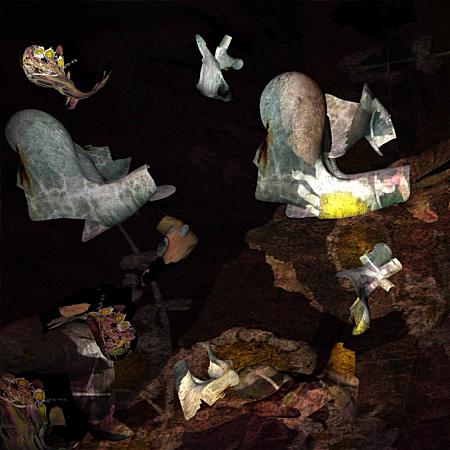
how dark and disconsolate your speech
Peter Ciccariello
invisible notes
_______________________
Otolliths issue thirty-four
from INFORMATION
Information
Bob Heman
(....)
Information
There are symbols we all recognize: the snowman and the pierced heart and the witch on her broom. There are other symbols that are less obvious: the blue hat and the broken bear and the tree that is burning. Each of us travels through our dreams with no more than a lantern to guide us. What we find is only what was left behind.
Information
Makes words out of flowers and words out of trees. Makes words out of bears and words out of bees and words out of the sea. Makes words out of mountains and words from the sky. Makes words from his hands and words from his eye. Makes words the woman repeats all through the night. Makes words that are only a part of her sight.
...(more)
More from Bob Heman's Information project
1 2 3 4
_______________________
Toward a General Theory of Distance
Lindsey Drager
conjunctions
(....)
What dictates a collection is self-iteration. The items, while at their nucleus the same, must be ostensibly diverse in order for the project to succeed. Children might be deemed a collection; former lovers or an exhibit of photographs. The corpses of birds that gather in the sills of the library window, too.
For what is fact but the collected debris of memory agreed upon in mass?
...(more)
_______________________
A New North: Contemporary Writing from Finland
Words without Borders August 2014
An Introduction to Finnish Literature
Lola Rogers
Words Without Borders
Finland is an enlightened modern Nordic welfare state, wired, highly literate and technologically advanced. Finland is also the most sparsely inhabited country in the European Union, mostly covered in forest, lake, and tundra, where urban life is a relative novelty and the average family spends weeks every summer in a small cabin by a lake or seashore, with no running water and often no electricity. Finland was part of the Swedish Empire for centuries. Its culture is firmly Nordic, its life dotted with Scandinavian standbys like coffee with cardamom buns and red wooden houses. But Finland’s shared border with Russia and ties to the Baltic states have effects that permeate its culture and politics. Like its sister language Estonian, Finnish is a Uralic language, neither Scandinavian nor Slavic—nor indeed Indo-European—and the oral folklore that preceded all Finnish literature, though it shares threads with all its neighbors, is utterly unlike any other and filled with magic. The heroes of Finland’s epic Kalevala are not Vikings but shamans.
A corresponding mix of ingrained social awareness, optimistic future-thinking, a fervent love for nature, and a large dose of magic is reflected in Finnish literature and in this small sampling from Finland’s contemporary literary scene. The recent Finnish writing in this issue encompasses a wide range of styles and themes, from works in the Nordic realist tradition to personal and confessional stories to Finland's own varied and ineffable version of Weird fiction. Much of it is also funny, a characteristic of Finnish writing from the beginnings of its literature in the nineteenth century, whose authors, as well as their contemporary counterparts, seem to have a peculiar ability to make you laugh and break your heart simultaneously.
...(more)
_______________________
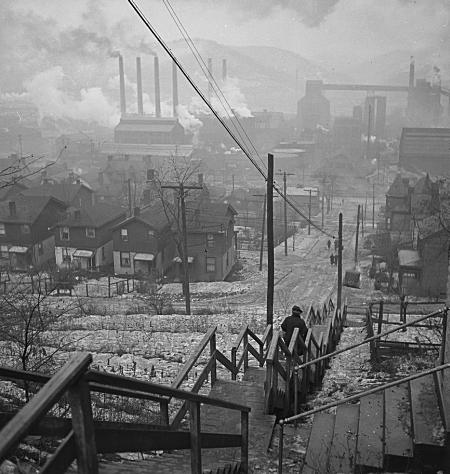
Pittsburgh, Pennsylvania
1940
Jack Delano
1 2
_______________________
Nietzsche’s Bastards
Michael- at synthetic-zero
(....)
... there must be ways forward; because life goes on regardless of how we interpret it to be. We are not our semantic mistakes, nor our projected phantasies, but actual bodies in movement and affective relation enacting consequential situations. And so forward we must go into the storm of nihilistic dissolutions and mournings and reactionary impulses seeking to exist, subsist and generate places and spaces of relief for all that we are given and all that we make. We must continue to communicate, scheme, plot, scavenge and design, but only now we do so with a semblance of awareness of what we do not and often cannot know or understand. The problems that plagued our thoughts and consciences – and our practices and institutions – in the past no longer motivate our existential and social projects. We become experimental beings; as much bricoleurs as ever but now consciously so, seeking solutions not truths, assembly not meaning. We thus become ‘post-nihilists’ by default and necessity.
Socrates was among the first ‘western’ philosophers to formulate a maxim around a reflexive awareness of the limitations of human thinking with his equation of wisdom with knowing that one does not know, but many profound thinkers and teachers east and west have also set about to make ‘neglect-awareness’ a central feature of their own philosophical stories: from Siddhartha (the Buddha) and the Gnostics to Nietzsche, William James, Wittgenstein and Derrida. Their works lay among the ruins of all those edifices build by so many other rhetoricians and professional discourse elites. And so finding out what works and what no longer applies after the tyranny of meaning has be deposed by the logic of sensation and flesh becomes a salvage operation lead by sadists and psychonauts whose only function now is to rouse and resonate with those huddled minorities no longer enchanted by the sorcery of language.
To be sure, there is no final liberation. We are phantasmic creatures burdened by the weight of our own cognitive luminescence. And no heroes remain. Not you, not me, not Socrates, not Obama – and none waiting to be born in the clash of necessity or immediacies of human coping. Idealistic transcenders and promethean consenters must give way to quiet transgressors and frenzied adapters who, being what they are, gather together on alternating occasions for Dionysian celebration and ritualistic intellectual humiliation.
The past cannot hold us because the urgency of now is intensifying. And the future was not cancelled because it never existed. We creep forward with disdain for all those spoon fed fascinations and lies propping up the contemporary condition. We are the bastard children of Nietzsche – exposed, temperamental and willing to take the practical exigencies of an immanent life to radical extremes.
...(more)
_______________________
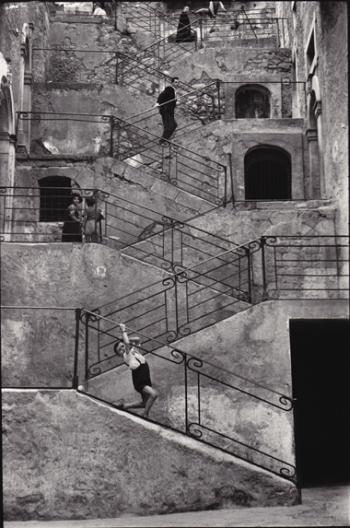 René Burri
_______________________
Pan-Psychism
Eric Linus Kaplan
A lot of people don’t like dualism and indeed, what’s to like? It always seems so cloojy! Recently it seems the old doctrine of pan-psychism has been dusted off in analytic philosophy as an alternative. It asks the question: Could everything be conscious at a very low level?
Maybe! But if everything is thinking, what is it thinking?
(....)
Does an electron think “I wish somebody would come along and measure me so I could have a definite location?” Why isn’t it okay not having a definite location? But if it is okay not having a definite location, is it okay not having a definite thought?
...(more)
Eric Linus Kaplan
Honest ontology, fantasy and comedy.
|
































